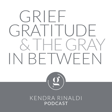
Grief, Identity, and Transition: Insights for Athletes and High Performers with Dr. Natasha P. Trujillo
Dr. Natasha P. Trujillo has a firm grasp on the complexities of grief and loss, both in her academic studies and personal experiences. In her forthcoming book, And She Was Never the Same Again, she challenges the idea of a "right" way to grieve, advocating against the pathologization and over-medication of grief. Drawing from her experiences, Dr. Trujillo emphasizes that grief is a deeply personal and natural process that should be embraced rather than suppressed.
Having immersed herself in the theories, concepts and research surrounding grief and loss, Dr. Trujillo has not only studied but also lived and integrated these principles into both her personal and professional life. Her journey has been a testament to the transformative power of understanding and navigating grief, a revelation that resonates deeply with those who encounter her work.
Currently practicing in Denver, Colorado, Dr. Trujillo specializes in addressing a myriad of issues including grief, loss, eating disorders, trauma, life transitions, identity development, anxiety/depressive disorders, perfectionism, and performance psychology. Her expertise extends to working with athletes and performers across the nation, both individually and within team settings. Dr. Trujillo's holistic approach to healing and her unwavering dedication to her clients make her a beacon of hope and resilience in the field of mental health.
To contact Kendra Rinaldi for more information or to be a guest on the podcast https://www.griefgratitudeandthegrayinbetween.com/


